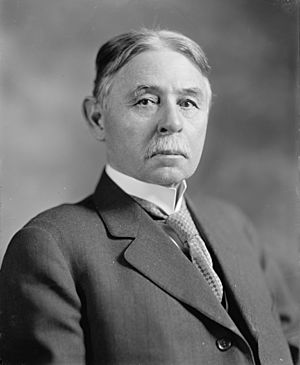Furnifold McLendel Simmons facts for kids
Quick facts for kids
Furnifold McLendel Simmons
|
|
|---|---|
 |
|
| United States Senator from North Carolina |
|
| In office March 4, 1901 – March 4, 1931 |
|
| Preceded by | Marion Butler |
| Succeeded by | Josiah Bailey |
| Member of the U.S. House of Representatives from North Carolina's 2nd district |
|
| In office March 4, 1887 – March 3, 1889 |
|
| Preceded by | James E. O'Hara |
| Succeeded by | Henry P. Cheatham |
| Personal details | |
| Born | January 20, 1854 Pollocksville, North Carolina |
| Died | April 30, 1940 (aged 86) New Bern, North Carolina |
| Political party | Democratic |
Furnifold McLendel Simmons (born January 20, 1854 – died April 30, 1940) was an important American politician from North Carolina. He was a member of the Democratic Party. Simmons served in the United States House of Representatives for two years (1887-1889). Later, he became a U.S. Senator for North Carolina, holding that position for 30 years, from 1901 to 1931. He was also in charge of the powerful Senate Finance Committee for six years. Simmons was known for his strong beliefs in segregation and white supremacy, and he played a big part in the events of the Wilmington insurrection of 1898.
Contents
Life and Political Career
Early Life and Beginnings
Furnifold McLendel Simmons was born in Pollocksville, North Carolina. His parents were Mary McLendel (Jerman) and Furnifold Greene Simmons. He grew up in North Carolina and later became involved in politics.
Efforts to Change Voting Rules
In 1894, a different political party, the Republicans, gained control of the North Carolina government. Simmons then led efforts to change voting rules. His goal was to make it harder for African American citizens to vote. He wanted to help the Democratic Party regain power across the state.
Simmons worked with newspapers that supported white supremacy. These newspapers spread false and harmful ideas about Black men. They claimed Black men were dangerous or not smart enough to hold public office or vote. These ideas were used to create fear and division.
Forming "White Government Unions"
Simmons also helped create many groups called "White Government Unions." These groups openly stated their goal was to win elections, even if it meant using violence. They aimed to control the government and keep African Americans from having a say.
As a result of these efforts, the Democratic Party won many elections in 1898. The day after the election, a violent event known as the Wilmington insurrection of 1898 happened in Wilmington, North Carolina. This event involved a mob overthrowing the local government and attacking African American citizens.
Becoming a U.S. Senator
In 1901, Simmons won the Democratic nomination to become a U.S. Senator. He then won the election and began his long career in the Senate. He used his position to build a strong political organization in North Carolina. This organization helped him stay in office for three decades.
Later Political Challenges
In 1928, the Democratic Party nominated Al Smith for president. Smith was the first Catholic person to be nominated by a major political party. Senator Simmons refused to support Al Smith. This decision earned him praise from groups like the Ku Klux Klan.
However, rejecting his party's nominee caused problems for Simmons. Along with the start of the Great Depression, these issues led to his defeat. In the 1930 Democratic primary election, he lost to Josiah W. Bailey. Bailey was supported by Governor O. Max Gardner. After this defeat, Simmons left the Senate.
 | Tommie Smith |
 | Simone Manuel |
 | Shani Davis |
 | Simone Biles |
 | Alice Coachman |

